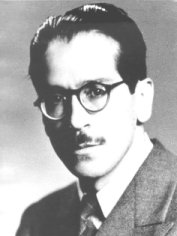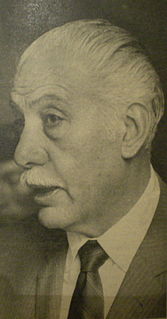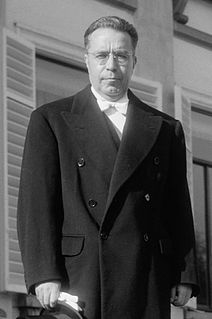
Hernán Siles Zuazo was a Bolivian politician who served as constitutionally elected president twice, from 1956 to 1960 and again from 1982 to 1985. He also briefly served as the temporary president in April 1952, and as vice president between 1952 and 1956.

Lidia Gueiler Tejada was the first female President of Bolivia, serving in an interim capacity from 1979 to 1980. She was Bolivia's first and only female Head of State, and the second in American history.

Juan Lechín Oquendo was a labor-union leader and head of the Federation of Bolivian Mine Workers (FSTMB) from 1944 to 1987 and the Bolivian Workers' Union (COB) from 1952 to 1987. He also served as Vice President of Bolivia between 1960 and 1964.

The Revolutionary Party of the Nationalist Left was a left-wing political party in Bolivia. It was founded in 1963 by the labor leader Juan Lechín Oquendo and by Mario Torres Calleja and Edwin Moller in lesser roles. The PRIN seceded from the Revolutionary Nationalist Movement (MNR) in protest against Víctor Paz Estenssoro's decision to seek a third elected term as president in 1964, rather than permit then Vice-President Juan Lechín to have the MNR's presidential nomination.

The Bolivian Socialist Falange is a Bolivian political party established in 1937. Despite its leftist-sounding name, it was a far-right party drawing inspiration from fascism. It was the country's second-largest party between approximately 1954 and 1974. After that, its followers have tended to gravitate toward the government endorsed military candidacy of General Juan Pereda (1978) and, especially, toward the ADN party of former dictator Hugo Banzer. Its current status is unclear.

Wálter Guevara Arze was a Bolivian statesman, cabinet minister, writer, diplomat, and president (1979).

General elections were held in Bolivia on 7 May 1989. As no candidate for the presidency received over 50% of the vote, the National Congress was required to elect a President on 6 August. Although the Revolutionary Nationalist Movement had received the most votes, its candidate for President Gonzalo Sánchez de Lozada was defeated by Jaime Paz Zamora of the Revolutionary Left Movement (MIR) in the Congressional vote, despite the MIR only finishing third in the public vote.

General elections were held in Bolivia on 1 July 1979. As no candidate in the presidential elections received a majority of the vote, the National Congress was required to elect a President. However, the Congress failed to elect a candidate after three ballots, and instead selected Senate leader Wálter Guevara to serve as Interim President for a year on 8 August. Guevara was later overthrown by a military coup led by Alberto Natusch on 31 October. Fresh elections were held in June 1980.

General elections were held in Bolivia on 29 June 1980, the third in three years. As no candidate in the presidential elections received a majority of the vote, the National Congress was required to elect a President on 6 August. With Hernán Siles Zuazo of the Democratic and Popular Union the favourite to win the Congressional ballot, the process was disrupted on 17 July by the military coup led by General Luis García Meza Tejada. However, Meza was pressured to resign on 4 August 1981, resulting in General Celso Torrelio becoming President. In July 1982 he was replaced by General Guido Vildoso, who was named by the high command to return the country to democratic rule. On 17 September 1982, during a general strike that brought the country close to civil war, the military decided to step down, to reconvene the National Congress elected in 1980, and to accept its choice of President. Accordingly, the National Congress revalidated the 1980 election results on 23 September and overwhelmingly elected Hernán Siles Zuazo as President on 5 October. He subsequently assumed the presidency on 10 October 1982.

General elections were held in Bolivia on 3 July 1966. René Barrientos of the Front of the Bolivian Revolution (FRB) was elected President with 67% of the vote, whilst the FRB won a majority in both houses of Congress. James Dunkerley describes the election as not free and fair since a major segment of the opposition was excluded from participating.

General elections were held in Bolivia on 5 June 1960. Víctor Paz Estenssoro of the Revolutionary Nationalist Movement (MNR) was elected President with 76% of the vote, whilst the MNR retained its large majority in Congress.

General elections were held in Bolivia on 6 May 1951. Víctor Paz Estenssoro of the opposition Revolutionary Nationalist Movement (MNR) received the most votes in the presidential election, but as he did not obtain an absolute majority, the National Congress was constitutionally obliged to elect a President on 6 August from the three candidates who received the most public votes. However, on 16 May a military junta assumed responsibility for the Government with Brigadier General Hugo Ballivián as President.
The Authentic Revolutionary Party was a political party in Bolivia.
The Popular Christian Movement was a political party in Bolivia, de facto controlled by the military junta.
The Leftwing Revolutionary Nationalist Movement was a centre-left political party in Bolivia.
The Revolutionary Nationalist Movement–Alliance was a centrist electoral political alliance in Bolivia.
The Revolutionary Nationalist Movement–Julio was a pro-military political party in Bolivia.










